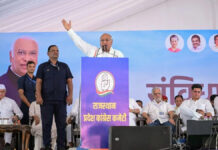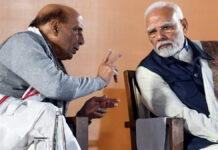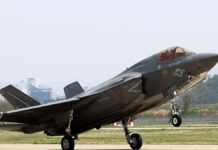G Parthasarathy
THREE major countries in South Asia will go to the polls next year — Bangladesh in January, Pakistan in February and India subsequently. Sri Lanka could follow suit in the second half of 2024.
Virtually bankrupt, Pakistan is dependent on US support for doles from the International Monetary Fund and the World Bank. The country is, for all practical purposes, being run by the army. The military leadership has set its sights on getting widely popular former PM Imran Khan debarred from participation in the parliamentary elections.
The developments are not going to affect Pakistan’s steadfast relations with its ‘all-weather’ friend’ China.
While lip service is being paid to democracy, Pakistan’s de facto ruler at present is the army chief, Gen Syed Asim Munir. It is evident that like other ambitious Generals in Pakistan, he enjoys American support. He visited the US last week; this was his first trip to that country as the army chief. The Pakistan army’s publicity wing gave prominence to his meetings with some of the seniormost functionaries in the Joe Biden administration, including the Secretary of State and the Secretary of Defence. General Munir is a handpicked choice of his predecessor and mentor, Gen Qamar Javed Bajwa, who had a notable role to play in supplying weapons to Ukraine at America’s behest.
The US Special Representative for Afghanistan, Thomas West, recently visited Islamabad, where he proclaimed US solidarity for Pakistan’s fight against terrorism. Evidently, the Biden administration has a short memory. It seems to have forgotten that Pakistan provided a haven to most-wanted terrorist Osama bin Laden. In 2021, then ISI chief had looked on nonchalantly as the Americans withdrew from Afghanistan and the Taliban moved into Kabul.
The latest developments are not going to affect Pakistan’s steadfast relations with its ‘all-weather friend’ China. General Munir’s main thrust at present is on charging Imran and his protégé, former Foreign Minister Shah Mahmood Qureshi, with offences which would render them ineligible to take part in the national elections.
The moves to debar Imran are being resented by many officers, soldiers and ex-servicemen, who are firmly on his side. More importantly, Imran appears to have the support of influential sections of the judiciary. It remains to be seen if he will get respite from the Supreme Court and is allowed to take part in the polls.
Pakistan’s armed forces are facing a direct challenge from the Pashtuns, who are backing the Taliban, on both sides of the Durand Line. India has wisely kept its channels of communication open with the ruling Taliban in Afghanistan. Hopefully, New Delhi will continue providing desperately needed wheat supplies to the Afghan people. Shipments from India to Afghanistan can now be made through the Iranian port of Chabahar, bypassing Pakistan.
But, even as the Narendra Modi government prepares for the Lok Sabha elections, it confronts new problems arising from challenges faced by the friendly Awami League government of Sheikh Hasina in Bangladesh.
The situation on India’s eastern borders has been complicated by the long-term prejudices of successive US governments against the Awami League. These prejudices have been a continuing feature from the days of the Bangladesh freedom struggle. This US approach is rather surprising, given the fact that the Awami League government has friendly ties with China, different from the nuclear and military dimensions of the China-Pakistan relationship, which the US strangely overlooks. Within the Awami League and even in India, there continues to be deep suspicion about foreign involvement in the assassination of the founding father of Bangladesh, Sheikh Mujibur Rahman, on August 15, 1975. The US had developed a close relationship with Gen Ziaur Rahman, who assumed charge of the country less than two years after Mujibur’s death.
Both India and Bangladesh share borders with Myanmar. India’s trans-border cooperation with Myanmar in dealing with insurgencies is well established. Given the prevailing unrest in Manipur, such cooperation assumes greater importance. Bangladesh is experiencing problems along its border with Myanmar on issues such as the influx of Rohingya refugees into its territory.
There is concern about the prospect of violence during the elections in Bangladesh, where radical elements have challenged Hasina’s secular government. It seems that both the US and Pakistan have an interest in denying another term to Hasina. She has a genuine reason to nurse grievances against the US and Canada, which have provided asylum to two former Bangladesh army officers who were involved in the assassination of her father Mujibur.
Another nation in India’s neighbourhood, the Maldives, is witnessing developments of interest to New Delhi. Prime Minister Modi has accepted a request from Maldives’ newly elected President Mohamed Muizzu to withdraw India’s small presence of military personnel from the island nation.
This was accompanied by an agreement to set up a high-level committee to promote Indian development projects in the Maldives. India had sent a military force to restore the Maldives’ sovereignty after it was taken over by mercenaries in 1988. However, the Muizzu government has pulled out of an agreement on cooperation in hydrology between the Indian Navy and the Maldives National Defence Force. The pact had been signed during PM Modi’s visit to the country in June 2019.




























